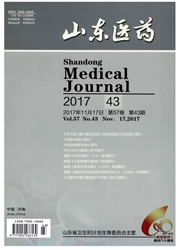

 中文摘要:
中文摘要:
目的初步研究IFN-λ在7种人食管癌细胞系中诱导的生物学作用。方法PCR检测IL-280L和IL-10B的基因及抗病毒分子基因的表达,流式细胞术检测主要组织相容性抗原的表达及细胞周期,二苯基溴化四氮唑蓝(MTT)检测细胞增殖。结果各食管癌细胞表达IL.28a和IL.10B的基因;IFN-λ诱导或上调2~5-寡腺苷酸合成酶(2~5-OAS)和黏病毒抗性蛋白A(MxA)的基因表达;IFN-λ可上调Ⅰ类主要组织相容性抗原分子的表达;IFN-λ可通过调控细胞周期的方式抑制食管癌细胞生长增殖。结论人食管癌细胞株表达IFN-λ受体复合体,IFN-λ具有抗病毒、抗增殖和免疫调节的生物学活性。
 英文摘要:
英文摘要:
Objective To investigate the biological function of IFN-λ in 7 human esophageal car- cinoma cells. Methods The gene expression of IL-28α, IL-1013 and antiviral molecule was examined with PCR. The MHC molecules expression and the profiles of cell cycle were analyzed with ilow cytometer. Cell proliferation was evaluated with MTT assay. Results All of esophageal carcinoma cells express the gene of IL-28a and IL-1013. IFN-λinduced or augmented the gene expression of antiviral molecules, 2'5'-OAS and MxA. IFN-λ enhanced the MHC class I molecule expression. IFN-λ inhibited the growth of esophageal carcinoma cells through the regulation of cell cycle distribution. Conclusion Esophageal carcinoma cells ex- press the IFN-λ receptor complex. IFN-λ has the antiviral, anti-proliferative and immunoregulation activity.
 同期刊论文项目
同期刊论文项目
 同项目期刊论文
同项目期刊论文
 期刊信息
期刊信息
